What Happens When Digital Cities Are Abandoned? Exploring the pristine ruins of Second Life and other online spaces
Laura E. Hall, The Atlantic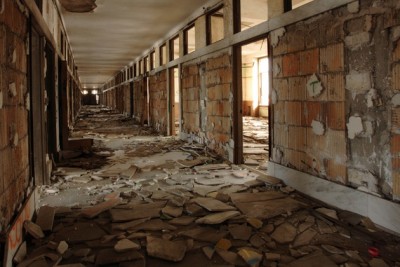
The Atlantic, 13 July 2014
What Happens When Digital Cities Are Abandoned? Exploring the pristine ruins of Second Life and other online spaces
Laura E. Hall, The Atlantic
The Atlantic, 13 July 2014
Co-habiting with Ghosts: Knowledge, Experience,
Belief and the Domestic Uncanny
Caron Lipman (Ashgate, 2014)
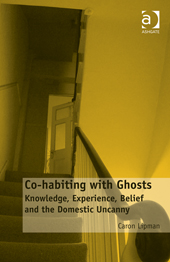 How does it feel to
How does it feel to
live in a ‘haunted home’? How do people negotiate their everyday lives with the
experience of uncanny, anomalous or strange events within the domestic
interior? What do such experiences reveal of the intersection between the
material, immaterial and temporal within the home? How do people interpret,
share and narrate experiences which are uncertain and unpredictable? What does
this reveal about contested beliefs and different forms of knowledge? And about
how people ‘co-habit’ with ghosts, a distinctive self – other relationship
within such close quarters?
This book sets out to explore these questions. It applies a non-reductive
middle-ground approach which steers beyond an uncritical exploration of supernatural
experiences without explaining them away by recourse only to wider social and
cultural contexts. The book attends to the ways in which households in England
and Wales understand their experience of haunting in relation to ideas of
subjectivity, gender, materiality, memory, knowledge and belief. It explores
home as a place both dynamic and differentiated, illuminating the complexity of
‘everyday’ experience – the familiarity of the strange as well as the
strangeness of the familiar – and the ways in which home continues to be
configured as a distinctive space.
Contents: Approaching
the ghost. Part I Spaces and Times of the Haunted Home: The material uncanny;
The temporalities of the haunted home. Part II Strategies of Cohabitation:
Embodying, domesticating, gendering the ghost; Strategies of distance and
communication. Part III Belief, Knowledge and Experience: Knowledge and
uncertainty; Belief, evidence and experience; Conclusion: the liminal
home/self; Appendix: the households; References; Index.
About
the Author: Dr Caron Lipman is Research Fellow at
the School of Geography, University of London, UK.
Reviews: ‘Most people have heard of ghosts: popular culture
is full of them. Many people will know of someone who has seen a ghost or had a
ghostly experience. Sometimes, people feel haunted, whether by tragedy or by a
sense of loss. But, for a few, paranormal activity is normal activity. People
do not just live with ghosts as a cultural or metaphorical or emotional figure:
they actually live with ghosts. In this extraordinary book, Caron Lipman deals
with extraordinary phenomena in ordinary life, in the home. Rich in testimony,
ever sensitive to people’s experience, she reveals how the people who live with
ghosts learn to accommodate them – and how, consequently, we all deal with
strangers and strangeness in our lives.’
Steve Pile, The Open University, UK
‘What does it mean to share your home with a ghost? Caron Lipman’s answers to
this question are thought-provoking and insightful. Foregrounding people’s own
experiences and beliefs in her exploration of the uncertain boundary between
material and immaterial geographies, she challenges much current thinking about
home and subjectivity in this highly original and beautifully written book.’
Ann Varley, UCL (University College London), UK
‘Large portions of this book, especially the interviews with the experients,
will be of great interest to students of folklore, and should be of interest to
psychical researchers and one often gets the sense that there are important
insights here’. The Magonia Review of Books
Society and Space review: http://societyandspace.com/reviews/reviews-archive/lipman/
From Pink Floyd to PJ Harvey, our Street View specialist shows us the world’s cities through the lens of famous album covers…
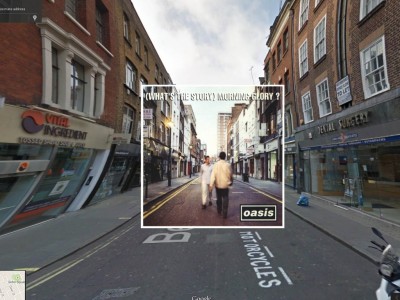
The Guardian, 7 April 2014
A lament for the death of bohemian London
John Harris
The eviction of the 12 Bar Club squatters is just the latest chapter in a devastating saga of politics aligning with business…
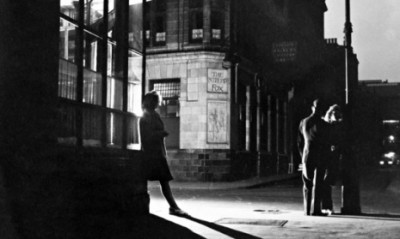
The Guardian, 6 February 2015
Toward an Urban Cultural Studies: Henri Lefebvre and the Humanities
Benjamin Fraser
Palgrave Macmillan, 2015. ISBN: 9781137498557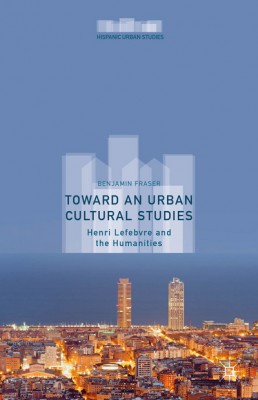 Toward an Urban Cultural Studies is a call for a new interdisciplinary area of research and teaching. Blending Urban Studies and Cultural Studies, this book grounds readers in the extensive theory of the prolific French philosopher Henri Lefebvre. Appropriate for both beginners and specialists, the first half of this book builds from a general introduction to Lefebvre and his methodological contribution toward a focus on the concept of urban alienation and his underexplored theory of the work of art. The second half merges Lefebvrian urban thought with literary studies, film studies and popular music studies, successively, before turning to the videogame and the digital humanities. Benjamin Fraser’s approach consistently emphasizes the interrelationship between cities, culture, and capital.
Toward an Urban Cultural Studies is a call for a new interdisciplinary area of research and teaching. Blending Urban Studies and Cultural Studies, this book grounds readers in the extensive theory of the prolific French philosopher Henri Lefebvre. Appropriate for both beginners and specialists, the first half of this book builds from a general introduction to Lefebvre and his methodological contribution toward a focus on the concept of urban alienation and his underexplored theory of the work of art. The second half merges Lefebvrian urban thought with literary studies, film studies and popular music studies, successively, before turning to the videogame and the digital humanities. Benjamin Fraser’s approach consistently emphasizes the interrelationship between cities, culture, and capital.
Cartographica
Volume 50, Number 1, Spring 2015
Special issue – “Deconstructing the Map”: 25 Years On
Articles to include:
Introduction: The Limits to Deconstructing the Map
Reuben Rose-Redwood
This
special issue marks the twenty-fifth anniversary of the publication of
J.B. Harley’s “Deconstructing the Map” (1989), which has had a major
influence in the fields of critical cartography, the history of
cartography, and human geography more generally. Over the last quarter
century, this essay and related works have also been widely cited by
scholars from a broad range of disciplines across the social sciences
and humanities, serving as a key reference for those seeking to theorize
the spatial politics of maps and mapping. Through such citational
practices, “Deconstructing the Map” has acquired a canonical status as
one of the classics of critical cartographic theory, yet the limitations
of its theoretical and methodological analyses are widely acknowledged
even by Harley’s strongest supporters. The contributors to this special
issue discuss their own critical engagements with this foundational text
as well as the extent to which Harley’s work still resonates with
contemporary perspectives in the field of critical cartography today.
The broader aim of this collection is therefore not to further canonize
Harley as the patron saint of critical cartography but rather to think
through the limits of “Deconstructing the Map” to ensure that current
and future theorizations of the power of mapping remain open to
self-critique and new becomings.
Cartography and Its Discontents
Matthew H. Edney
This Is Not about Old Maps
Denis Wood
“Snapshots of a Moving Target”: Harley/Foucault/Colonialism
Daniel Clayton
Reflections on J.B. Harley’s “Deconstructing the Map”
John Krygier
Harley and Friday Harbor: A Conversation with John Pickles
Jeremy Crampton and Matthew W. Wilson
Reflecting on J.B. Harley’s Influence and What He Missed in “Deconstructing the Map”
Martin Dodge and Chris Perkins
Tracing the Map in the Age of Web 2.0
Wen Lin
Still Deconstructing the Map: Microfinance Mapping and the Visual Politics of Intimate Abstraction
Sarah Elwood
Deconstructing the Map after 25 Years: Furthering Engagements with Social Theory
Leila M. Harris
Looking “beyond” Power: J.B. Harley’s Legacy and the Powers of Cartographic World-Making
Reuben Rose-Redwood
_______________________________________
Cartographica is available online at:
Project MUSE – http://bit.ly/cartopm
Deep
Maps and Spatial Narratives
Edited by David J. Bodenhamer, John Corrigan and Trevor M. Harris
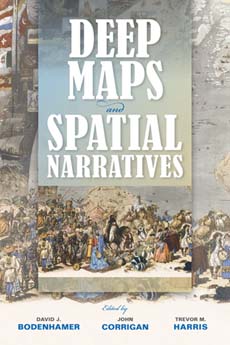
“Deep Maps and Spatial Narratives sets out to describe ‘deep mapping,’ an enhanced environment of data from widely distributed sources used to create a contextual view of a place, a network of social aspects, and environment, as the next step forward in the use of geo-referenced information. It spells out the state-of-the art in the use of new technology in mapping and geo-registration and its ramifications for history, geography, social sciences, cultural studies, environment research, and the humanities. The articles are filled with suggestions and viewpoints that are stimulating [and] the questions raised numerous and complex.”—Lewis Lancaster, University of California Berkeley
Deep maps are finely detailed, multimedia depictions of a place and the people, buildings, objects, flora, and fauna that exist within it and which are inseparable from the activities of everyday life. These depictions may encompass the beliefs, desires, hopes, and fears of residents and help show what ties one place to another. A deep map is a way to engage evidence within its spatio-temporal context and to provide a platform for a spatially-embedded argument. The essays in this book investigate deep mapping and the spatial narratives that stem from it. The authors come from a variety of disciplines: history, religious studies, geography and geographic information science, and computer science. Each applies the concepts of space, time, and place to problems central to an understanding of society and culture, employing deep maps to reveal the confluence of actions and evidence and to trace paths of intellectual exploration by making use of a new creative space that is visual, structurally open, multi-media, and multi-layered.
David Bodenhamer is Executive Director of The Polis Center at IUPUI and Professor of History. He is co-editor (with John Corrigan and Trevor M. Harris) of The Spatial Humanities: GIS and the Future of Humanities Scholarship (IUP, 2010).
John Corrigan is the Lucius Moody Bristol Distinguished Professor of Religion and Professor of History at Florida State University. He has authored or edited numerous books on the history of religion, including
Religion and Space in the Atlantic World (forthcoming).
Trevor M. Harris is Eberly Professor of Geography at West Virginia University. He is one of the early contributors to the GIS and Society critique of spatial technologies.
Indiana University Press
February 2015 256pp 36 b&w illus., 5 maps, 2 tables 9780253015600
£21.99 now only £16.49 when you quote CSL215DEEP when you order.
http://www.combinedacademic.co.uk/deep-maps-and-spatial-narratives
Cultural Mapping and the Digital Sphere: Place and Space
Ruth Panofsky & Kathleen Kellett, Editors
University of Alberta Press (May 2015) ISBN: 9781772120493
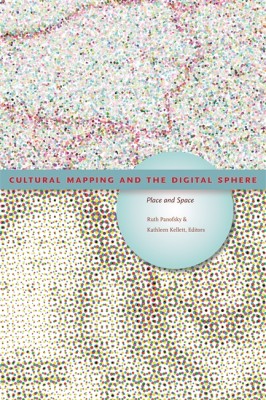
“Notwithstanding their differing approaches—digital, archival, historical, iterative, critical, creative, reflective—the essays gathered here articulate new ways of seeing, investigating, and apprehending literature and culture.” – From the Preface
This collection of fourteen essays enriches digital humanities research by examining various Canadian cultural works and the advances in technologies that facilitate these interdisciplinary collaborations. Fourteen essays in English or French survey the helix of place and space: While contributors to Part 1 chart new archival and storytelling methodologies, those in Part 2 venture forth to explore specific cultural and literary texts. Cultural Mapping and the Digital Sphere will serve as an indispensable road map for researchers and those interested in the digital humanities, women’s writing, and Canadian culture and literature.
http://www.wsupress.wayne.edu/books/detail/cultural-mapping-and-digital-sphere
Nightwalking: a subversive stroll through the city streets
Walking at night has always been the pursuit of the lost, the lonely, the deviant and dispossessed. Yet in today’s cities it can have a rebellious role…
http://www.theguardian.com/books/2015/mar/27/nightwalking-subversive-city-streets-london-matthew-beaumont
Edinburgh’s literary history mapped at the click of a button ‘Lit Long’, a searchable interactive map of the city, will take users to locations made famous by Scottish writers from Walter Scott to Irvine Welsh – and tell you what they wrote
The Guardian, 28 March 2015
What is the most private city in the world?
The proliferation of high-security, privatised plazas is making parts of world cities such as London and Dubai reminiscent of an airport lounge

The Guardian, 26 March 2015
http://www.theguardian.com/cities/2015/mar/26/what-most-private-city-world
ECREA TWG MEDIA & THE CITY 2015 CONFERENCE
Urban Media Studies: Concerns, intersections and challenges
University of Zagreb, Faculty of Political Science, 24–25 September 2015
Confirmed keynote speaker: Ole B. Jensen, Professor of Urban Theory, Dept. of
Architecture, Design and Media Technology, Aalborg University. Other keynote
speakers to be announced soon.
Call for papers and panels
Media related practices are grounded in the city – where the majority of human
population today lives – and media as both technologies and representations
pervade nearly all aspects of urban living, cutting through diverse forms of
public appearance, community, control, resistance and habitation.
As a result, none of the established perspectives in media studies, whether
that of democracy and participation, production and technology, representation
and use, or belonging and identity, can claim to have an exhaustive
understanding of their problematics without appreciating the urban context. In
the same way, no urban process can be fruitfully tackled without taking into
account the involvement of media and media related practices.
Yet, despite being closely – though unevenly – entwined, from small towns to
megalopolises, the two complexes, media and the city, have remained disjointed
in the scholarly analyses. In fact, it can be argued that for media scholars in
particular, the city has remained a terra incognita.
Wishing to revive the initial enthusiasm in media studies, which started as an
interdisciplinary endeavour, Urban Media Studies conference aspires to provide
a dialogic space for disciplines interested in mediated urbanism. We also hope
to stimulate critical reflections on the challenges of collaborating across
disciplinary boundaries. Thus, though speaking from the position of media
studies, we invite submissions from scholars who work in all relevant fields that
interface with the key issue of media and the city. These include, but are not
limited to, such fields as urban geography, urban sociology, architecture,
anthropology, science and technology studies, visual and sound/auditory culture
studies, sociology of the senses, and other related subfields.
We specifically welcome submissions which deal with the following themes and
approach them with an interdisciplinary curiosity – as potential intersections
between two or more fields of research:
Historical connections between urban studies and media studies
Urban spaces and media practices
Urban sociality and media
Mediation of urban daily life
Media, architecture and urban design
‘Media cities’ as production clusters and complexes
Performing and audiencing (in) the mediated city
Media, urban power, resistance and conflict
Media, gender and the city
Media, ethnicity and the city
Urban spaces of media consumption
Urban law in the digitally sustained cities
Mediated urban sensescapes
Urban, outdoor and ambient advertising
Fashion as urban communication
Urban gaming
Journalism and the city
The city as a mediated ecosystem
Urban mediation and spatial negotiations
Methodologies of urban media studies
Teaching about media and the city
We welcome both individual and multi-authored abstracts, and full panel
proposals (with four presentations; 15–20 minutes per presentation). In the
case of panel proposals, the candidate chair should provide a title and a short
general description of the proposed panel, together with the abstracts of all
presenters.
In addition to conventional academic presentations of original theoretical,
methodological and/or empirical research of any of the above or other related
themes, we encourage practice-based presentations, like urban films and
documentaries, sonic projects and other exploratory artwork that probe issues
of media and the city.
Abstract proposals (300 words) for presentations and panels, together with
short bios, should be submitted tomediacity.twg@gmail.com
by May 1st, 2015. Authors will be informed of acceptance by June 1st, 2015.
The conference will also feature a special dialogic plenary where participants
from different disciplines will be invited to share views on their work in the
context of media and the city.
As part of our commitment to stimulate interaction between scholars from
different disciplines, we shall also be organising a guided urban exploration
of Zagreb’s industrial, modernist/utopian architectural heritage, and
post-industrial urban developments.
A selection of papers will be published in an edited book and/or in a journal
special issue.
Conference fee is 50 Euros for ECREA members, 70 Euros for non-members. The fee
will cover conference materials, and coffee and lunch both days.
Any queries should be sent to conference organizers Seija Ridell (University of
Tampere, Finland), Simone Tosoni (Catholic University of Milan, Italy) and
Zlatan Krajina (University of Zagreb, Croatia). Please use the conference
e-mail address:mediacity.twg@gmail.com.
OBS. For the conference updates, please follow the Media& the City
websites onhttp://twg.ecrea.eu/MC/ andhttps://www.facebook.com/mediaandthecity